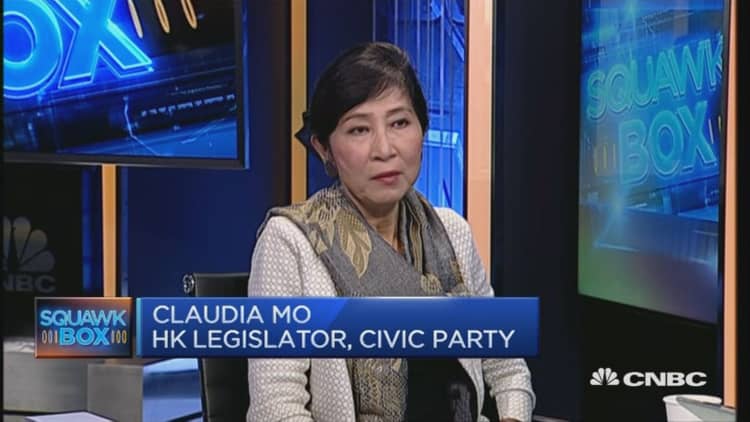China's prominent display of power in a Hong Kong legal case this week may have ramifications for another territory that has testy ties with Beijing: Taiwan.
Taiwanese President Tsai Ing-wen's ruling Democratic Progressive Party (DPP) released a statement on Wednesday urging Chinese leaders to "listen to the aspirations of the people of Hong Kong eager to practice democracy."
The DPP and people of Taiwan were closely monitoring how Beijing handled "the problem in Hong Kong" and supported the right of Hong Kongers to choose their representatives in a democratic fashion, the statement continued.
In response, a mainland spokesman asked Taipei to stop such "misleading comments and conduct," according to Xinhua.
On Monday, the world's second-largest economy issued a ruling on a case involving pro-independence elected Hong Kong lawmakers—a move that pre-empted local courts and called into question rule of law in the city, a special administrative region (SAR) of China.
Beijing's intervention in Hong Kong "signals the likelihood of elevated tensions with Taiwan in coming months," Eurasia analysts flagged in a note this week. Ahead of a key leadership transition in the Chinese Communist Party next year, "China's top leaders cannot afford to be seen as weak on matters considered core interests for the party, including Hong Kong and Taiwan," the note continued.
And Taipei's bold support for the SAR is likely to exacerbate already-tense China-Taiwan relations.
Five months ago, Chinese President Xi Jinping's administration cut off official communication with Tsai's administration for her failure to adhere to a principle that Beijing considers crucial to cross-strait tries.
Tsai has yet to acknowledge the "One China" policy under a framework called the "1992 Consensus," which Beijing claims is a tacit understanding reached between the two governments that acknowledged there was only one China. However, the contract also stipulates that the mainland and Taiwan could have their own interpretation of what 'One China' meant.
But in contrast to Eurasia's views, some believe it may not be in Beijing's interests to intensify the quarrel with Taipei.
Unlike the SAR, Taiwan maintains a separate ruling authority, explained Katherine Hui-Yi Tseng, research associate at the National University of Singapore. "It will be unwise for Beijing to explicitly suggest that its treatment of HK will be equally applied to Taiwan."

Beijing considers Taiwan as a province, but political figures in the island-nation hold different views on Taiwan's status. Tsai and her DPP party are considered independence-leaning and do not recognize that Taiwan is part of the People's Republic of China. But the opposition Kuomintang (KMT) is pro-China and against the idea of Taiwanese autonomy.
Renewed protests in Hong Kong following China's legal ruling may trigger similar demonstrations of support in Taiwan, noted Mark Harrison, a Taiwan specialist and senior lecturer at the University of Tasmania.
"Hong Kong and Taiwan both see a possible future in each other: Taiwan sees one future under Beijing's rule, and Hong Kong sees a possible democratic future," he explained.
Harrison believed this week's developments in the SAR could actually benefit Taipei.
"Without the capacity to directly intervene in Taiwan's institutions of government, events in Hong Kong if anything strengthen Tsai's position, both in terms of her policy argument to Taiwanese voters and by showing the limits of Beijing's options over Taiwan."
Beijing has no capacity to install a KMT government except through military force, he noted. For now, Chinese policymakers are simply reaching out to the KMT in order to undermine Tsai, he said.

